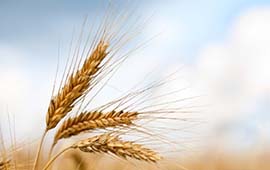Despite the fact that the EU countries do not have their own sown area for growing wheat, Europe is actively engaged in its processing.
The thing is that on the territory of the countries that are part of the European Union, there are many main factories that are engaged in deep processing of grain. This means that derivatives are obtained from wheat – starch, additives and fractions, which can then be used to obtain various food and non-food products. In particular, we are talking about feed, bioplastics, packaging and additives for animals. Wheat processing is one of the main industries in Europe today, and the products obtained as a result of grinding wheat are actively exported to other countries.
What you need to know about wheat processing
Wheat processing consists of three stages, during which bran, flour, dough, and also smaller fractions such as starch, gluten, pentosan and soluble substances are obtained from the grain. In addition, specialized factories have equipment that allows you to wash and thicken starch, sift and dehydrate gluten, and process soluble substances.
Thanks to this, coatings, food packaging, animal feed, enzymes and biodegradable plastic are made from the resulting raw materials.
In which EU countries wheat is processed
For this process, the most modern technologies are required, which are located mainly in the USA and European countries. In the EU, by the way, there are 78 factories – in total in 21 countries. Germany, France and Austria are the leaders in grain processing into small components. In these countries, there are not many of their own sown areas, and those that do exist are mainly given over to rapeseed. At the same time, the components of wheat are very important for the EU, and Europe buys raw materials from such granary countries as Ukraine, Russia and Kazakhstan. Because of this, in Europe, some documents for Ukrainian grain were canceled in order to simplify its import and purchase wheat at more favorable prices.
Note that only the market for the production of starches is estimated at 67.5 million tons, respectively, this processing technology will develop even more actively in the future. This feature will also affect Ukraine, which will continue to supply large volumes of its products to European markets.
Profitability
In the countries of the world, there is no question of whether it is worth pursuing this technology, since the statistics speak for themselves. From 200 tons of grain, with proper processing, you can get up to 17 thousand tons of dry gluten, 30,000 tons of fruit syrup, more than 60 thousand tons of starch and 40,000 tons of bran. The production itself is low-waste, which is especially important in the context of global trends in environmental friendliness. Accordingly, grain producers must carefully monitor their quality requirements in order to profitably sell their products to European markets.






